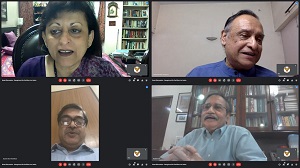On August 25, a Book Discussion on Ambassador Bhaswati Mukherjee’s book "Bengal and its Partition: An untold Story" was organised by the Vivekanand International Foundation. The discussion was chaired by Dr. Arvind Gupta, Director. Author Amb. Bhaswati Mukherjee was joined by Amb. Chandrasekhar Dasgupta, Mr. Jayanta Roy Chowdhury, Prof Shahid Amin as discussants.
The partition of Bengal was one of the major events in the world’s history. It had the elements of politics, violence, and cultural repression, the struggle for territorial and political autonomy among others. To highlight these elements, historians, political observers and experts have written a plethora of literature. However, the recent account of the Bengal Partition by Ambassador Bhaswati Mukherjee Bengal and its Partition comes as an insightful amalgamation of history, personal observations and a strong pitch for reasons that could have helped to avoid the Bengal Partition.
A united Bengal had been home to a composite and syncretic culture where language played the cardinal role in keeping the culture intact than the religious divide between Hindus and Muslims. While a stream of history blames Mughals for being aliens to Indian soil in explaining the religious divide between the rulers and the majority Hindu population, it is the British rule in India that worked on the principles of divide and rule and left Bengal in tatters. The deceitful victory of the East Indian Company in the Battle of Plassey had sowed the seeds of partition. The colonial rule of the British Empire destroyed the economic wellbeing resulting in an impoverished Bengal and left millions of the farmers without lands and those farmers who could produce little were levied high taxes. These exploitive policies of the Empire resulted in the Great Bengal Famine of 1943-44.
In the 19th Century, the two-nation theory had become ominous to the cultural unity between the Hindus and Muslims. However, the 1857 Sepoy Mutiny was an indication of alarming resistance against the British Rule in India which later backfired against the Empire as they attempted Hindu-Muslim agenda for sepoys serving in the British Indian Army. 1857, in many ways, changed the narrative forever. There was united opposition to British colonial power which the British understood and planned to harm harmony to their benefit. To tackle this, a sense of fear was created that the Hindu majority will be a risk at the hands of Muslim rulers and leaders. These poisonous grapes fell on poisonous soil. While the Muslims in Bengal were no less Muslims, their food habits like fish and rice, dark skin, and reading Koran in Bengali resulted in a syncretic culture. It was enough for the British to fuel the divide between the Muslims of Bengal and the Pathans. It is there that this narrative of two nations was solidified.
Further, the British historians had taken up the task of narrating India’s history on dividing lines of religion than composite and syncretic culture. British Empire used its loyalists like Bengal Chief Minister H.S. Suhrawardy to stage a barbaric August 16, 1945 ‘Direct Action Day’ to fabricate and propagate poisonous public views on a homeland for Muslims. It had turned into a nightmare for Bengal as thousands of Bengalis were thrown into a civil war on the religious lines. Such initiations were further venomed by leaders like Jinnah who was a moderate looking Muslim but ended up using extreme two nation’s propaganda to divide Bengal.
Meanwhile, the partition of Bengal could have been avoided, had the Indian National Congress (INC) been ready to be guided by the Bengal National Congress (BNC). However, whatever was lost in the process of India’s partition in terms of culture and identity, the creation of Bangladesh retained those values partially. For instance, the national anthem of newly created Bangladesh was adopted from Ravindra Nath Tagore’s poems, and Poet Nazrul Islam received a grand welcome when he travelled from Kolkata to Dhaka. Satyajit Ray’s films in Bangladesh ran full house and theatres were often captured at gunpoint so they could watch the first show of new his releases.
Therefore, although the syncretic culture was broken out on the eve of partition, religion could never become the basis of Bengali culture which one could see from the Bengal Muslim league’s breakout. The newly created fraction of the Bengal Muslim League became the Bengal Awami Muslim league and later it was converted to Awami League to give it a more secular outlook.
Author Amb Bhaswati Mukherjee concluded the session with a quote from the German philosopher Georg Hegel’s famous quote “the only thing that we learn from history is that we learn nothing from history.”








Post new comment